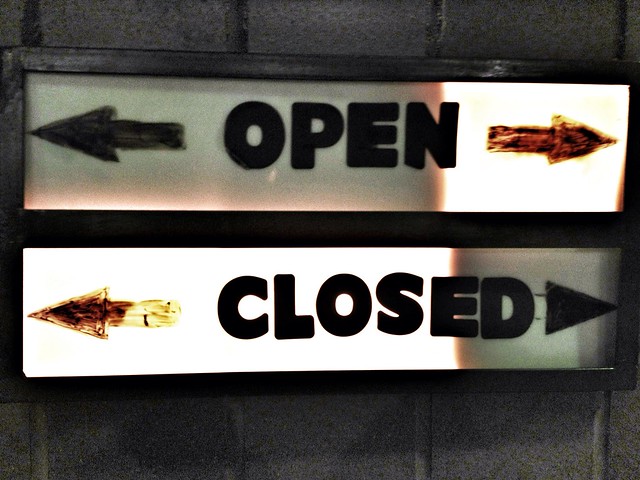[760 words]
https://flic.kr/p/dwEfLb
Despite my best intentions, I was unable to get very far this year on the OpenLearning CMOOC/faculty collaborative. As interesting as it was, the activities began at a time when I was already committed to a number of other high-priority projects and duties, especially the following: 1. my work teaching an online course (with a few students who had “incomplete” grades and needed extra attention and guidance from me, as well as additional time to complete their work); 2. taking an online course where a major assignment was due at the end of March; and 3. multiple presentations at the NeMLA 2019 conference in the Washington DC area (program available by clicking the following URL: http://www.buffalo.edu/content/dam/www/nemla/NeMLA%202019/NeMLA%202019%20Convention%20Program.pdf). It was way to much for me to handle. So, of course, the first thing that I jettisoned was the least pressing, even if the most interesting, Gardner Campbell’s CMOOC. (I know that it was not, strictly speaking, “Gardner Campbell’s” but that’s how I think of it, since he is one of the originators and animating spirits of this CMOOC course on open learning that invites collective reflection on learning, on openness and on how open learning may be affected — or effected — by technology.)
In spite of bailing out of the OpenLearning ’19 CMOOC, I continue to think about open learning, especially in the context of online education. What is more, I am as determined as ever to develop and run a free course on using target-language media resources in French to develop intercultural capability (or intercultural competence, if you prefer, or even intercultural communicative competence). Indeed, I think that this will be one of my major initiatives this year. I am also going to continue to explore openness as a general pedagogical concepts.
That does not change a certain skepticism that I have relative to “open learning” in certain forms. One of the things that irks me is the existence of “openlearning.com,” which looks a bit like a commercial vehicle for monetizing online teaching expertise by encouraging instructors develop independent courses that the site will host for a fee while hinting at the possibility of financial returns for the teacher. Of course, what they do not say is that designing a course, publicizing it in a way that is likely to attract significant student interest, running it a way that will do more than simply satisfy one’s customers, but also give them skills and/or knowledge of very high value, so high, in fact, that it will motivate them to publicize your course, and to do all of this in a way that is sustainable and feasible… is an almost impossibly difficult task for a single person to manage on her or his own. So the intimation that it can be profitable is, in my view, an exploitation of some folks’ naïveté. Teachers with what might be a good idea for a course pay good money to buy a subscription so that they can develop and host their course using the OpenLearning infrastructure, possibly in the hopes of making money… even though in most cases, individuals are likely to fail to create a commercial winner that is also academically excellent. This scheme, of course, makes money almost exclusively for OpenLearning.
Now, that said, I note that there are some institutions that seem to have invested significant and substantial resources in the develop of truly open learning resources, like Open University, MIT and Carnegie Mellon (their truly free and open courses, OpenCourseware and Open Learning Initiative sites) and, of course “kinda’ open” MOOCs (edX, Coursera, France Université Numérique/FUN, etc.). Yes, many teachers, thinkers, pedagogues, leaders, and visionaries who are truly committed to the “Open” ethos and to CMOOCs and the like. So I’m not skeptical about everything. But when websites and Twitter-voices talk about Open, there is almost always some confusion about exactly what they mean. Open textbooks licensed through Creative Commons are one thing. Truly free open courses are something different. Disguised “ransomware”ostensibly free materials and courses are yet another kind of proclaimed “openness.” So… folks are not always precise and forthcoming about which flavor or orientation of “Open” they mean.
So part of what I intend to do in coming weeks is to reflect on Open and different kinds of “openness.” I’ll critique the ideas and I’ll point toward those dimensions and implementations that I think are the most valuable, ethical and productive. And, of course, I’ll label and discuss those items that are not so honest, are less than fully ethical, or otherwise seem problematic.
So… stay tuned for some research into… and critical thinking about… “Open.”
-RRD


